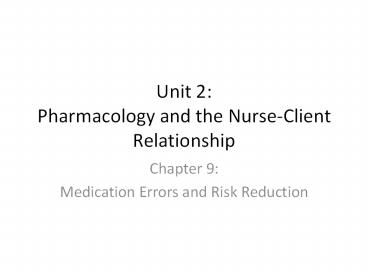Unit 2: Pharmacology and the Nurse-Client Relationship - PowerPoint PPT Presentation
1 / 15
Title:
Unit 2: Pharmacology and the Nurse-Client Relationship
Description:
'any preventable event that may cause or lead to inappropriate ... Automated, computerized, locked cabinets for medication storage on client-care units ... – PowerPoint PPT presentation
Number of Views:129
Avg rating:3.0/5.0
Title: Unit 2: Pharmacology and the Nurse-Client Relationship
1
Unit 2Pharmacology and the Nurse-Client
Relationship
- Chapter 9
- Medication Errors and Risk Reduction
2
Medication Errors
- any preventable event that may cause or lead to
inappropriate medication use or client harm while
the medication is in the control of the
healthcare professional, client, or consumer. - Definition from the National Coordinating Council
for Medication Error Reporting and Prevention
(NCC MERP)
3
Medication Errors
- Why are medication errors such a concern?
- What are key factors contributing to medication
errors by the health care provider? - What are key factors contributing to medication
errors by the client?
4
Common Medication Errors
- Identify examples of common medication errors in
relation to - Medication administration
- Lack of follow-up or clinical correlation
- Misinterpretation of orders
- Who are the collaborative partners in medication
administration
5
Categorizing Medication Errors
- NCC MERP
- Index for Categorizing Medication Errors
Algorhythm (Figure 9.1, p. 91) - Index for Categorizing Medication Errors (Figure
9.2, p. 95)
6
Nurse Practice Act and Standards of Care
- Explain the relationship of the Nurse Practice
Act to medication error. - Explain the relationship of standards of care to
medication error. - What is the rule of reasonable and prudent
action?
7
Impact of Medication Errors
- Most common cause of morbidity and preventable
death within hospitals - No acceptable level
- All errors should be investigated
8
Reporting and Documenting Medication Errors
- Document according to agency policy.
- Report with an incident report.
- In relation to the associated legality, why is
documentation of the error important?
9
Reduction of Medication Errors-Assessment
- Assess
- Food or medication allergies
- Current health concerns
- Use of OTCs and herbal supplements
- Review
- Recent laboratory tests
- Recent physical assessment findings
- Identify
- Need for education about medication regimen
10
Reduction of Medication Errors- Planning
- Use only approved abbreviations
- Question unclear orders
- Do not accept verbal orders
- Follow policies and procedures
- Ask for client participation
11
Reduction of Medication Errors-Implementation
- Be aware of potential distractions
- Remove distractions if possible
- Focus on medication administration task
- Practice six rights
12
Reduction of Medication Errors- Evaluation
- Assess client for expected outcomes
- Determine if any adverse effects have occurred
- How will you ensure that you pass medications
safely?
13
Client Education Associated with Medication
Administration
- Client education will decrease the number of
medication errors. - What needs to be provided to the client?
- What should the nurse teach the client?
14
Agencies that Collect and Report on Medication
Errors
- FDAs MedWatch
- Institute of Safe Medication Practices (ISMP)
- MedMarx
15
Reducing Medication Errors in Health Care
Facilities
- Methods
- Automated, computerized, locked cabinets for
medication storage on client-care units - Risk management departments
- Collaboration with nursing to modify policies and
procedures































![[PDF] Foundations of Mental Health Care 8th Edition Android PowerPoint PPT Presentation](https://s3.amazonaws.com/images.powershow.com/10077869.th0.jpg?_=20240712087)